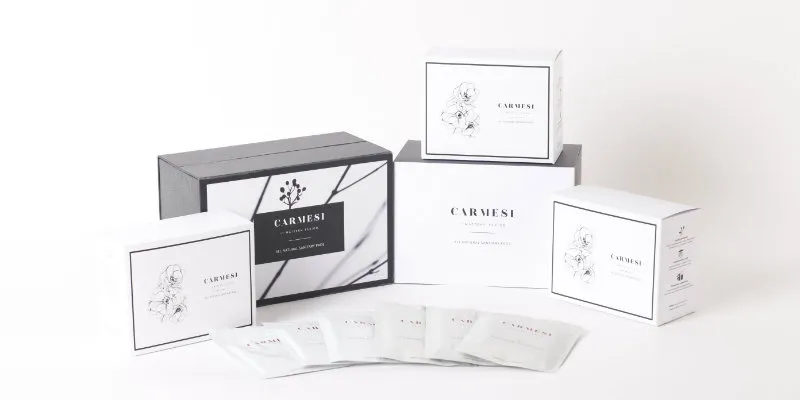Carmesi revamps the traditional sanitary napkin, gives an all-natural, chemical-free spin
Carmesi is an e-commerce brand for all-natural sanitary pads, founded by Tanvi Johri and Rikshav Borah, with a vision to make periods a ‘safe’ time of the month for women.
Startup: Carmesi
Founders: Tanvi Johri and Rikshav Borah
Year it was founded: 2017
Where it is based: New Delhi
Sector: Health and wellness
The problem it solves: Menstrual hygiene by providing natural sanitary napkins
Funding raised: Seed round from individual investors
It’s been almost 15 years since Tanvi Johri (26) started menstruating, and all the generic brands in the supermarket had given her rashes and allergies.
Moreover, disposability of these pads was a huge hassle for her. “This made me question the severe dearth of quality products available in the market, and a sense of neglect by the menstrual hygiene industry to the overall needs and well-being of women when they are on their periods,” she says.
Taking a cue from her past experiences she started researching more about the industry.
Tanvi says, “I found myself facing the fact that it is not a mandate for sanitary pad brands to disclose the ingredients used in the pads. I felt a strange frustration that I had never cared to find what my sanitary pad contained ever before.”
For a person who almost every time read the ingredients of her face wash, creams, shower gels and countless other products, this came as a revelation of sorts.
“How could I have been so blind to the fact that a product that I use on one of the most sensitive areas of my body is plain synthetic? Right then, I couldn’t have been surer of the fact that most women had no idea of what they were exposing their bodies to, and that something needed to be done about it,” she added.

The eureka moment
That was the eureka moment for Tanvi, and she decided to provide women with a product that not only cares for them but also educates and empowers them.
Carmesi offers premium, all-natural sanitary pads that are made using all-natural ingredients.
She says, “Most sanitary pads available in the market are made of synthetic materials and contain harmful chemicals. These pose a severe health risk to women in the long run.”
The Carmesi pads, on the other hand, are made of bamboo fiber and cornstarch, without any harmful synthetics or chemicals.
Carmesi is a Spanish word which means the colour ‘crimson’. Tanvi says, “Period blood has, for decades, been shown in ads as a blue liquid by all sanitary pad brands. With our brand name, we are challenging this closed mentality that periods are something dirty or to be ashamed about."
For Tanvi, it was also extremely important to ensure that women feel empowered with this product and service. That’s why it offers the consumers a comprehensive care for every aspect of the menstrual cycle.
“Our customers receive their pads in a beautiful vanity box, unlike the black polythene bags that scream of shame and embarrassment. We offer them the flexibility to choose their preferred mix of sizes and get their delivery schedule tailored to their period dates,” she says.
It also comes with disposal bags that allow for a convenient and hassle-free disposal.
Soon after making the decision to take the entrepreneurial plunge, Tanvi brought in her friend, Rikshav Borah (29), as a co-founder to the company. “When I told my co-founder, Rikshav, about what I intended to build, I did not expect him to know too much about the product. He took his time to research the market and build his own opinions about what the industry was lacking.”
Joint efforts
She added, “What surprised me, even more, was the fact that as a man, he did not hesitate a bit to approach multiple women and ask them about their experiences with conventional products (given the fact that even women don’t feel comfortable talking about this). And only after he was completely convinced with what I intended to do, did he declare extremely passionately his support for the idea."
Tanvi is often asked about her decision to bring on board a male partner for a product that’s clearly only for women. Tanvi says, “I strongly believe that the conversation around periods should not only be restricted only to women. It is time for men to acknowledge and understand the importance of menstruation in a woman’s life.”
Tanvi started her professional career with WeAreHolidays, a startup in the online travel space. She then moved on as a brand marketer at nearbuy.com (Groupon India) before starting Carmesi in 2017.
She has an MBA in Marketing from International Management Institute, and a bachelor’s degree in Chemistry from Hindu College, Delhi University.
Rikshav has a work experience of over five years in companies like Cisco and Yatra.com. Extremely passionate about startups, he had also co-founded another startup, which went on to be acquired by yatra.com. He has a BTech in Electrical Engineering from IIT, Bombay.

Steady growth
Carmesi is currently servicing over 4,000 customers per month, and seeing a month-on-month growth of about 30 percent. Its pricing starts at Rs 349 for a pack of 10.
As more and more people today are moving to healthier and safer products in every category. Carmesi wants to focus on educating the customers about the benefits of a natural product, during the buying process. Talking about its steep pricing, Tanvi says, “Apart from a healthier choice, women realise the other convenient aspects of using our service with respect to customisation in sizes, getting delivery tailored to one's period cycle, as well as a hassle-free disposal.”
The Carmesi consumers typically start with the smallest one-month pack and then move on to higher plans when convinced of the product. “The higher plans we offer are much more cost-effective for women, and offer the conveniences not available with any other sanitary pad brand in India,” Tanvi adds.
Technavio’s research analyst predicts the global sanitary napkin market to grow steadily at a CAGR of approximately five percent during the forecast period. Due to the encouraging market conditions, the majority of women in rural areas are now able to afford sanitary napkins at subsidised rates. This, in turn, has increased the penetration of sanitary napkins in the rural sector, worldwide.
Most of the natural sanitary pad units are located in small towns and are aimed at rural women. Saathi pads, Soukhyam in Kerala, Sakhi pads in Vadodara, and Aakar Foundation’s Anandi pads are a few such eco-friendly, low-cost, biodegradable sanitary napkin brands. Among quality brands aimed at urban women, there is Nisha Bains’ Purganics, Heyday and international brands like Organyc and Natracare.

Highlighting what makes Carmesi pads different from the commercially available sanitary napkins, Tanvi says,
“It is completely natural. Carmesi sanitary pad is made with completely natural ingredients. The top sheet is made of cornstarch while the middle absorbent layer is made of bamboo fiber, and the bottom layer made with corn-based bioplastic. This makes the pad completely natural, and free of harmful synthetics or chemicals.This is in stark contrast to the other sanitary pads available in the market, which are completely based on synthetics and chemicals. These pads pose a severe health risk to women in the long run.”
With the 100 percent biodegradable products, Carmesi is leaving no stone unturned. “As a part of our efforts to be more responsible towards the environment, we still have a long way to go in this direction, and are working very hard to make our packaging also completely biodegradable,” Tanvi adds.
The product is currently available through its commerce website and other online marketplaces like Amazon, Flipkart, Nykaa and Purplle.
The startup raised a seed round of funding in May 2017 from leading angel investors like Sunil Kalra, Arun Venkatachalam, Startup Buddy Ventures and senior members from the consultancy firm Arthur D Little - Adnan Merhaba, Viditha Kanakamedala and Rohit Sethi.
The users have the option to either buy a one-time pack or choose a subscription from the website. “The longer subscription plans are much more cost-effective and convenient. Under the subscription plans, we provide quarterly deliveries tailored to the period cycle of a woman. Each delivery comprises the supply of a quarter. Most women start with a one-time purchase, get assured about the product quality, and then move on to the bigger plans,” says Tanvi.
In the future, the startup aims to expand the product portfolio to be able to offer the other products women need to cater to their menstrual hygiene needs.







